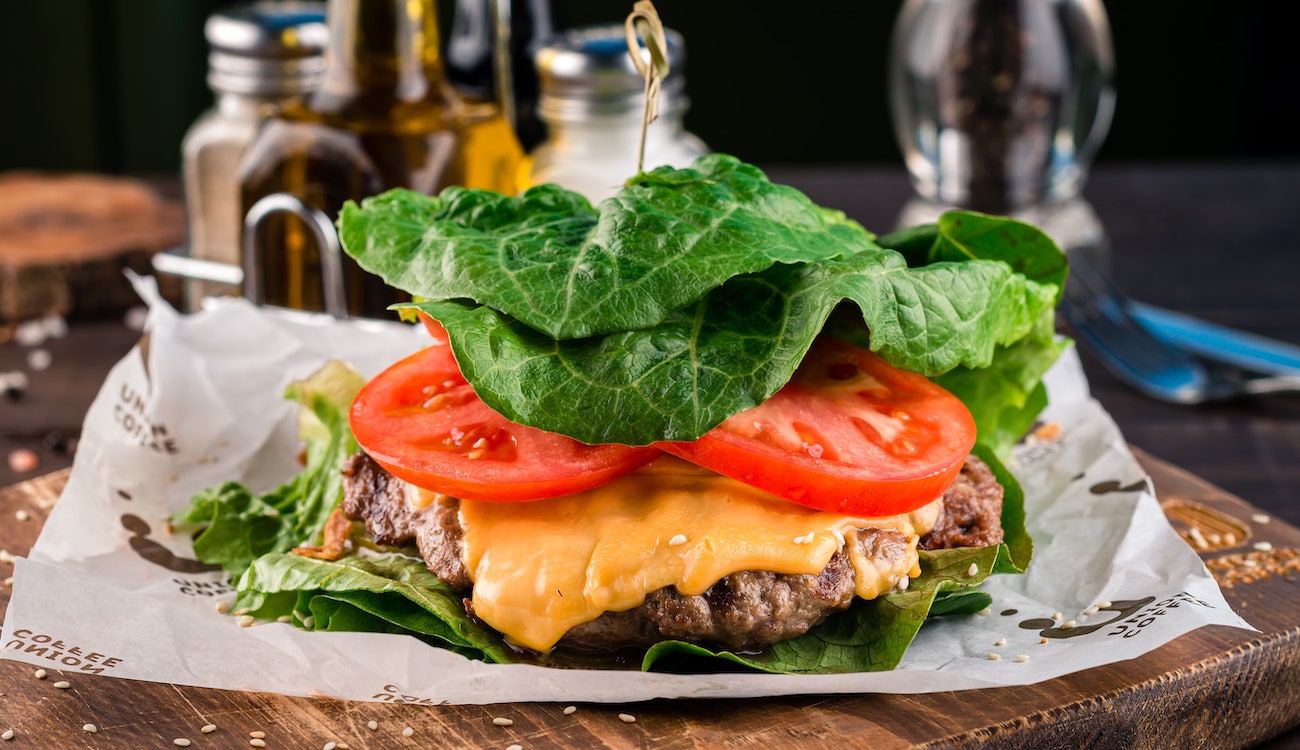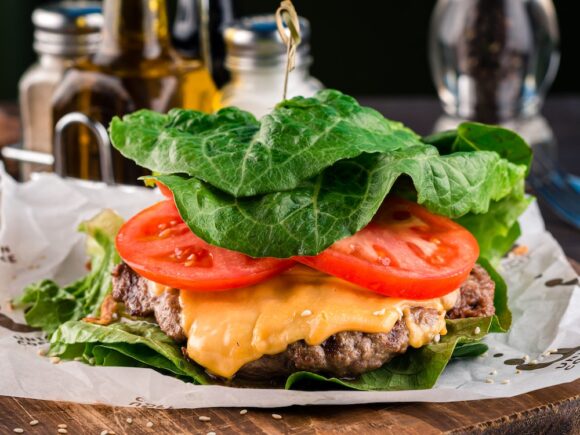The Keto Weight Loss Timeline: How Much Weight Can You Lose on Keto?


Maybe you’ve heard that keto weight loss is much faster than the average diet, and you’re thinking about giving it a try.
But if the word diet makes you cringe, don’t worry – this article will help you learn how to go keto and lose weight without suffering.
So if you’re frustrated with clothes that fit too snugly, have constant aches and pains, or feel sluggish no matter how much coffee you drink, the keto diet may be just what you need to jumpstart your weight loss.
After all, any diet can be a great way to learn healthier habits that kickstart a life full of energy – and the Keto Cycle app can help you get there.
So, how fast and how much weight can you lose on keto? Read on to find out.
How Does the Keto Diet Work?
The ketogenic diet involves eating low-carb and high-fat foods to change the way your metabolism works.
Normally, your body uses carbs for energy. These carbs are broken down, and whatever isn’t fiber ends up in a simpler sugar form called glucose. This is the main source of energy that’s taken up by your cells to work properly.
But when you don’t get enough carbs, your body has to use one of the other macronutrients, like fat or protein, for energy instead.
The keto diet is designed to help you stop relying on sugar for energy and instead rely on stored and dietary fat. When this switch happens, you enter a metabolic state called ketosis, where cravings can decrease, and hunger hormones can stabilize.
How Does Ketosis Help You Lose Weight?
Your body produces molecules called ketones instead of glucose to use fat for energy. So when fat is your main energy source, and there aren’t many carbs available, your entire metabolism switches into this state called ketosis, where it’s running entirely on ketones instead of glucose.
#1 Burns more fat
Staying in the state of ketosis with a high-fat diet can help you burn fat more easily since it’s the main energy source available.
Normally, we have some sugar in our bloodstream when we’re snacking or eating a lot of carbohydrates with our meals, which means we always have some sugar available to our cells. This means that body fat stays where it is, which is why it’s not easy to lose body weight when you always have new sources of sugar available. On keto, your sugar intake will be limited.
#2 Stabilizes hunger hormones
The keto diet might also help reduce your cravings and appetite. Since you eat mostly protein, healthy fats, and fiber-filled vegetables, you’ll be fuller for longer periods of time. Your blood glucose levels stay relatively low, keeping your hunger hormones more stable.

Simple carbs, on the other hand, can cause a spike in your blood glucose right after eating them. That means that as soon as you absorb it, your blood sugar levels can dip, making you feel hungry again.
How Much Weight Can I Lose on Keto?
Weight loss will never be the same for everyone. Even two people with the same general body type, activity level, and eating habits can lose weight differently.
The amount of weight you can lose on keto depends on a variety of factors:
- Stress levels and mental health
- Chronic health conditions
- Total calorie intake
- Starting weight
- Sleep habits
- Activity level
- Genetics
- Gender
- Age
Of course, getting help with a keto diet app can help you lose weight more easily and efficiently. It takes away the stress of having to hunt for recipes, making it more likely you’ll cook instead of eating unhealthy take-out. It also offers a community of support and lets you track your eating habits, which can make it easier to stay on top of your goals.
An average weight loss on keto is usually at least 2.2lb (1kg) per week for the first few weeks, with some people losing around 8.8lb (4kg) per week – but again, that doesn’t mean you should expect that specific number for yourself since it depends on many of the factors listed above.
Keto Weight Loss Timeline: What to Expect?
The most important thing to remember is that weight loss is not a linear process. You may have a week or two where your weight drops, a week with no change, and another with a slight gain – and that’s OK.
The first step for anyone starting a weight loss journey is to prepare mentally. Try not to get too caught up in the numbers because it’s healthy habits that will give you a healthy weight that will last a lifetime.
That said, here’s a general idea of what to expect if you’re starting from a more sedentary and overweight point.
Week 1
After a few days of eating less than 50g of carbs, your body uses up its stored glycogen in your muscles and liver and begins to enter ketosis. It can take up to a week for some people, but either way, you’ll likely notice a big drop in your weight during this first week.
Most people lose around 2.2–8.6lb (1–4kg) of body weight in this first week. Of course, it depends on your starting point and the factors listed above, as well.
Keep in mind that losing weight on keto could also be due to a loss in water weight since each gram of glycogen is stored in muscle mass with at least 3g of water.
Finally, since going keto is a big adjustment for your body, you might notice some symptoms, such as the keto flu or mood swings, but they should dissipate after a few weeks.
Week 2
Week 2 is where things start to get more interesting. You will notice much more than just a few pounds off the scale as your body becomes more efficient at using ketones for energy, including increased energy levels and mental clarity. By week two, weight loss will likely slow down, and you can expect to lose an average of 2.2–4.4lb (1–2kg) per week.
Month 1
Studies point out reductions in appetite and weight after one month, with significant appetite decreases. You shouldn’t expect to keep losing several pounds per week after a month on keto, as weight loss will slow down over time as your body adjusts to the diet.
For many people, this is the time when they hit a weight loss plateau, so don’t freak out if this happens to you. It’s a natural part of the process. You should always expect more weight loss in the beginning, especially since much of it is a byproduct of keto water weight loss.
Nevertheless, if you stop losing weight on keto after one month and want to break through the plateau, it could be time to try new strategies. Maybe that’s a new exercise routine, introducing new foods, speaking with a nutritionist, or trying intermittent fasting paired with keto.
Month 2
Weight loss should be quite noticeable by the second month. A study conducted by Nature showed that after 2 months on the keto diet, participants lost 13% of their starting weight, with improved insulin and blood pressure levels.
How Long Should I Do Keto?
How long you should spend on the keto diet depends on a variety of factors, including negative side effects on your mental and physical health. Watch out for headaches, constipation, digestive or sleep issues, and disordered eating habits.
In general, many people follow the keto diet for a few weeks or months until they feel they’ve achieved their primary goals and can slowly reintroduce more carbohydrate-rich foods without feeling too restricted.
While you can stay on keto for an extended period of time, research on long-term dieting is limited. There are some health issues associated with restricting carbohydrate intake for longer than 6 months, so it’s recommended to stick to this time frame.
Who Shouldn’t Do Keto?
While the keto diet can be a helpful way to start your weight loss journey, it’s not for everyone.
If you fit into any of these categories, it’s best not to start any diet without talking to your doctor:
- History of eating disorders. This is a strict diet that can be very triggering for people with a history of disordered eating behaviors. Studies show that strict dieting can lead to eating disorders and obesity, so it’s important to be very aware of how dieting affects your mental health.
- Liver, pancreatic, thyroid, or kidney conditions. High-fat and protein diets put a strain on the liver, pancreas, thyroid, and kidneys.
- Gallbladder disease. Keto may increase cholesterol levels, which can lead to gallstones or other gallbladder issues.
- Pregnant or breastfeeding women. A strict keto diet may lead to some nutritional deficiencies necessary for the fetus or infant’s growth and development.
- Certain medications. Blood pressure medications, insulin, or diuretics may all need to be adjusted.
Even if you don’t identify with one of the categories, it’s still always recommended to get a full medical checkup before beginning a new diet. For example, 1 in 3 US adults doesn’t even know they have high blood pressure. You never know what factors might be contributing to your weight or any symptoms you’ve been feeling, including something as common as fatigue.
How to Lose Weight Faster on Keto
Everyone wants to lose weight fast – but that won’t give you healthy results in the short or long term.
Your focus should always be on adopting healthier habits for lifelong results, not on the number on the scale.

Follow the key steps to weight loss listed below, and you’ll be on your way to establishing habits that will last a lifetime and help you avoid weight gain in the future.
Key to Maintaining Keto Weight Loss
#1 Get the Keto Cycle app
If you want to stick to the keto diet, it’s necessary to start by tracking your macros to see just how many carbs, fats, and proteins you’re getting regularly. That’s where the Keto Cycle app comes into play. It can help you plan and transition to a low-carb diet easily, with personalized plans that fit your lifestyle.
You’ll get:
- Access to thousands of delicious recipes, with none of the foods you hate
- A supportive community of over 60,000 members
- Advice from professional nutritionists
- Easy ways to track your progress
- Daily weight loss tips
It’s important not to underestimate just how helpful a supportive community and tracking your behavior is. Studies show monitoring your goals makes you more likely to achieve them. Plus, support is going to give you that extra push you need, especially on those days when you’re tired and stressed.
#2 Eat whole, nutrient-dense foods
Technically, you could live on the ketogenic diet consisting of steak, butter, cheese, and cream – but that won’t help you shed the pounds fast or keep your heart (or any organ, for that matter) healthy.
The best way to treat your body is to give it the nutrition it needs. That means lots of unprocessed, vitamin-rich foods to give you energy. Slowly add more of these foods to your day:
- Raw seeds and nuts
- Fresh or frozen fruits and vegetables
- Olive, avocado, and a bit of coconut oil for cooking and baking
- Plant-based proteins, such as legumes, tofu, or vegan meats and protein powders
- Free-range, hormone-free animal products, such as organic chicken or sustainably caught fish
Make sure your fat intake is focused on whole food sources to get all the nutrients you need while maintaining a calorie deficit.
#3 Move your body more
We often think that to lose weight, we have to hit the gym 5 days a week. Thankfully, that’s nowhere near the truth, exercising on keto can be easy and stress-free.
Science shows that even small amounts of exercise, as long as it’s consistent, are the most likely to help you maintain a healthy weight. So think about how you can add in 5 minutes of movement here and there throughout your day. This could mean taking a walk at lunch, a walk after dinner (which helps you digest food and reduces blood sugar spikes), or even doing an 8-minute Tabata Youtube video every morning.
#4 Don’t let a slip-up stop you
You don’t have to eat perfectly all the time. After all, no one does – not even nutritionists!
So if you’ve had a few tough days and find yourself eating unhealthier or more than usual, cut yourself some slack. It’s natural to feel hungrier when you’re stressed; your body is simply asking for more energy to deal with whatever crisis it’s facing.
When you do have cravings, first think about some keto options that might satisfy you – even if they’re processed. After all, if you eat well most of the time, the occasional unhealthy food isn’t usually a problem. Plus, if it’s still keto, you don’t have to worry about leaving ketosis.
But if you have eaten something sugary, don’t let that stop you from continuing your ketogenic diet. You don’t have to drop everything, feel ashamed, or fall into a binge eating cycle. Remember, perfection isn’t possible when you’re human! So instead of spiraling down, open up your Keto Cycle app and look for support from the community because you’ll find some great tips and advice to help you out.
Final Thoughts
People often forget how important it is to keep your mental health in mind when it comes to weight loss. After all, completely changing your diet can be very stressful. That’s why it’s best to start gradually as you learn which foods and habits work for you. Otherwise, you can put a lot of pressure on yourself, which makes it easier to binge and purge.
Self-compassion is one of the most underrated and important mindsets to cultivate whenever you begin something new, and that includes changing your diet.
Science also shows that focusing on one habit at a time gives you the best chance of long-term success. So don’t rush into anything, and give yourself the time to learn what is and isn’t manageable. Remember, you can always reassess and change your goals, and the Keto Cycle app is there for you to do just that – monitor, edit and adapt, get support, and find new ways to achieve your weight loss goals. You even get a customized keto diet plan after taking a quick quiz adapted to your food preferences.
In the end, what you really want is to feel better. So if what you’re doing isn’t working, try something else that’s small and easily manageable – and do it with compassion.







